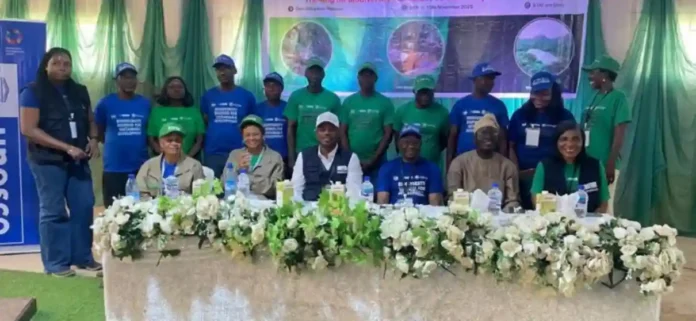The United Nations Educational, Scientific and Cultural Organisation (UNESCO) on Monday began a six-day biodiversity business training for 10 communities around the Omo Biosphere Reserve in Ogun State.
The training, which is part of the Nigeria–UNESCO Biodiversity Business Project, aims to build the capacity of participants in environmental education, biodiversity conservation, and nature-based ventures such as fishery and piggery businesses.
Funded by the India–UN Development Partnership Fund, the programme is being implemented in collaboration with the Ministry of Environment, the Forestry Research Institute of Nigeria (FRIN), the National Park Service, and the Nigerian Man and Biosphere Committee.
The theme of the programme is “Biodiversity Business in Omo Biosphere Reserve, Oban Biosphere Reserve, and Shere Hills Reserve, Nigeria: A Means to Poverty Reduction, Biodiversity Conservation and Sustainable Development in Nigeria.”
Dr Jean-Paul Abiaga, Head of UNESCO Abuja Office and Representative of UNESCO to Nigeria, said the project aligns with one of UNESCO’s major goals, which is balancing conservation and sustainable development.
According to him, “This is especially important today as the international community strives to protect 30 per cent of the planet’s land and sea by 2030. At UNESCO, our philosophy is simple but powerful; to reconcile nature protection with human development within our biosphere reserves.”
Abiaga emphasized that the project is a reflection of courage and collective effort to link conservation with community well-being. “We encourage you to continue this partnership so that together, we can ensure this project delivers real and lasting benefits for both people and nature,” he said.
He added that UNESCO remains committed to working hand in hand with all stakeholders to achieve the project’s objectives. “UNESCO reaffirms its full commitment to working hand in hand with you to achieve the project’s objectives and to deliver lasting results for the people, the communities and the ecosystems of Nigeria,” he said.
Speaking on behalf of the Minister of Environment, Mr Balarabe Lawal, the Director-General of FRIN, Prof. Zacharia Yaduma, said the programme would help communities make sustainable use of their natural resources while preserving ecological integrity.
He noted that environmental education and business training are key to promoting community responsibility and long-term sustainability. “By equipping participants with management and entrepreneurial skills, we are promoting the development of nature-based businesses that enhance local resources, alleviate poverty and promote sustainable production methods,” he said.
Yaduma added that the training provides an opportunity to share knowledge, strengthen partnerships, and promote innovative approaches that align environmental conservation with local economic development. He urged all participants to engage actively and come up with practical ideas that could enhance livelihoods while protecting the environment.
Dr Enang Moma, National Professional Officer, Natural Science Sector, UNESCO, recalled that during the validation workshop held in May, participants had selected piggery and fish farming as focus areas for biodiversity-based business development.
Moma said the programme supports Nigeria’s National Development Plan (2021–2025), which emphasizes poverty reduction, biodiversity conservation, and sustainable development. “This training will strengthen the capacity of participants to operate biodiversity businesses and green income-generating livelihoods in a sustainable manner while reducing harmful human activities in forests,” she explained.
She also said the initiative would help ensure that communities benefit economically from the conservation of natural resources.
Mr Olukayode Shonibare, Immediate Past Manager of the Ogun State Plantation Project, highlighted the state’s ongoing efforts to combat deforestation. “Before now, every year we can plant up to 1000 to 2000 hectares with the support from the World Bank and African Development Bank, but now that the intervention is no more there, the state government is doing its bit,” he said.
According to him, the state now plants an average of 50 to 100 hectares of trees every year, focusing on replanting indigenous, endangered, and exotic species to restore biodiversity. “We are hoping to do more,” he added.
The benefiting communities include Aba Kurudu, Abeku 1, Etemi, Eseke, Sojukorodo, Owode, Apora, Akorede, Osoko, and Mokore.

